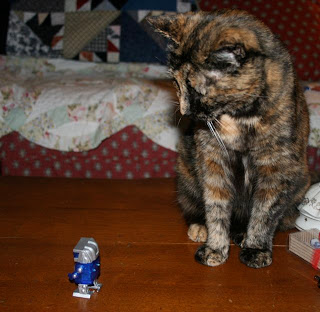
By scar and callus,
His kingdom now
A shattered palace,
We drink his cup,
No fear, no malice,
This broken bowl,
His sacred chalice.
Just whose hands are scared and callused? What kingdom is it that now is shattered? Whose cup is it at our lips? Why must we drink? Why no fear or malice? What is broken about the bowl? What makes this chalice sacred? Where does "sacred" live?
I wrote this poem yesterday, at noon, at work, in the middle of a very busy holiday retail workday. I'm not sure why the words came to me, but the poem formed itself pretty completely in just a few minutes and I had to stop and write it down on the back of some scratch paper. Several hours later I read it to a friend who dropped by the shop. After I did, her eyes widened and she told me she had just come from witnessing the death of a close friend of her husband.
He had died just a couple of hours earlier, in fact at noon. He died bitter with regrets over his perceived failure to express his love to friends, his failure to get together with friends from the past, the failure to appreciate the good times he had had with others and most of all his failure to help others whom he knew were in need when he could have.
I had been thinking of my poem in terms of this world that we live in as a shattered palace, once lovely now degraded by war, overpopulation, pollution and such, degraded by our own disappointments and false views. I had been thinking of ourselves as the suffering Christ and our own scared hands. The cup as the life that we live, drinking perpetually this less than perfect, wounded moment. This moment, this life itself, as the sacred chalice. If life is not sacred, then what could be? If "sacred" lives at all, surely it is living no other place than in our own hearts and minds. It is our knowing and living itself that gives life to the sacred. How could anything be sacred if tainted with fear or rancor?
But my friend's story forced home a more specific view. Here is one small life, one man, his life now ended. His body a shattered palace, certainly, but his dreams and cares, his feelings of love and friendship lie shattered too, now at an end and shattered by his own inaction. Up to the end, the bitter cup he was forced to drink was of his own making.
Lets us take heart and courage from the knowledge that we are the sacred chalice, we carry the light of life within us all. Lets us all, my friends and loved ones, take warning from the sorrow of another. Let us keep this cup we drink sweet with love, let us share the love we feel with others and when we depart, let us do so with a glad heart.
Use care as you prepare
The cup before you,
Sweet wine or gaul,
Remember,
It is you who
Will drink it.
The lovely broken chalice above is the work of craftsman Ron Chamberlain. It and more can be seen on his website: http://www.rdchamberlin.com/Home.html



















